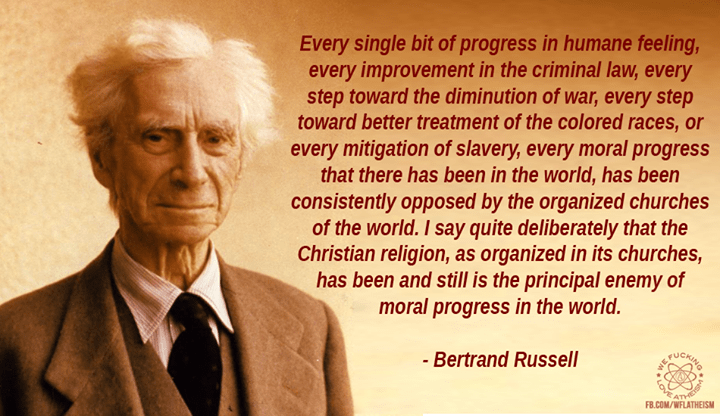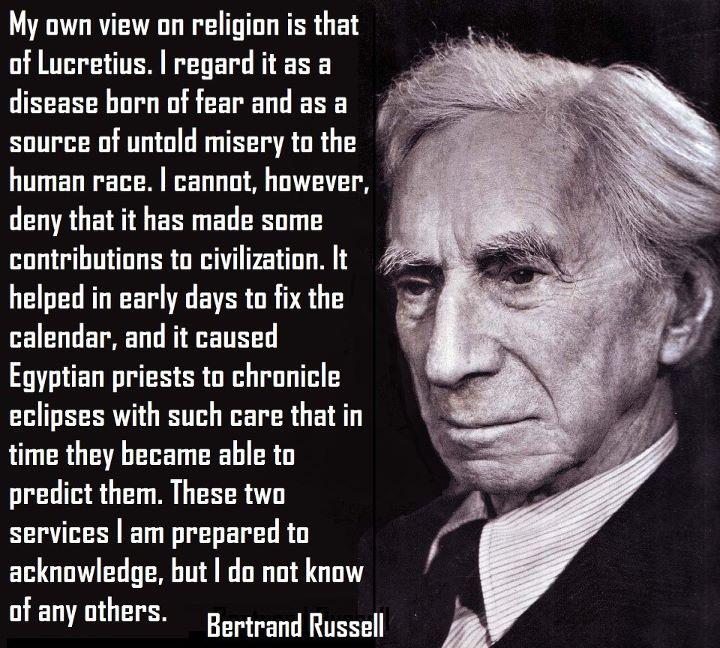I am, in this age when there are a great many appeals to unreason, an unrepentant Rationalist. I have been a Rationalist ever since I can remember, and I do not propose to cease to be so whatever appeals to unreason may be made.
We are not yet, and I suppose men and women never will be, completely rational. Perhaps, if we were, we should not have all the pleasures that we have at present; but I think complete rationality is so distant a prospect that we need not be much alarmed by it, and the nearest approach that we are likely to get is sure to be all to the good. I certainly find that there is a very great deal of irrationality still about in the world.
Complete rationality is so distant a prospect that we need not be much alarmed by it.
Bertrand Russell
As far as I can see, the view to which we are committed is that we ought not to believe, and we ought not to try to cause others to believe, any proposition for which there is no evidence whatever. That seems a modest proposition, and if you can stick to that you will be fairly sure that you are not going to become a sort of ossified endowed church. We ought not to commit ourselves to dogmatic negations any more than to dogmatic affirmations; we ought merely to say that there are a great many propositions about which men and women feel pretty certain, but, concerning which they have no right to feel certain, and it is our business as Rationalists to try to make them see that those things are not certain. I am told that that is a very wicked position to maintain.
There is a very large amount of Rationalist work required in the world. I think the battle is quite as fierce as ever it was. Take, for example, America. America is a very important country. What America thinks today the rest of the world will be forced to think tomorrow, and therefore what America thinks is important. There are some hopeful features about America [but] the great bulk of Americans are still extremely theological. Moreover, we have to face the very serious position due to the growth of the Roman Catholic Church in America, because, as far as I can see, the Roman Catholic Church is likely to dominate America in another fifty or a hundred years by the sheer increase of numbers, and not by rational propaganda. That is a very grave matter, and a matter which I think will affect the whole of the civilized world very much In Boston, which was once the home of advanced Protestantism, the Roman Catholics rule the whole place. In America, men are still sent to prison for Atheism. The Americans tend more and more to rule the world, and we shall find ourselves in a very difficult position unless we can more or less liberalize them.
Bertrand Russell
Rationalism is not believing a proposition or causing others to believe it unless there is at least some reason for supposing it to be true.
We have to realize that the attitude of Rationalism, which I defined as that of not believing a proposition or causing others to believe it unless there is at least some reason for supposing it to be true, is by no means widespread. Take the matter of education. In most countries of the world, a great many extremely dubious propositions are taught to the young. Public money which goes to education will not be given to any education that involves no element of superstition; it is quite impossible for the young to attain the necessary minimum of virtues unless you produce an extremely large number of very bad arguments in favour of that virtue — arguments which, of course, they will see through as soon as they get a little older.

I think that any virtue that you may believe in should be one that you can support from the very first without appealing to anything that you do not yourself believe. Education will have to be quite enormously transformed if that view is accepted. I believe that it is at present illegal in every country of the world to teach children in the kind of way which skilled medical practitioners would consider the best for their mental health. That is one point upon which irrational convictions as generally held interfere, and there are a number of ways in which it is at present impossible to educate rationally without coming up against the authorities. The authorities are organized upon a basis of certain irrational dogmas, and those dogmas are not all of them theological. Some are theological, and some are of other sorts; but the rational habit of mind is a very rare one.
I think that we ought to do all that we can to bring before the world the importance of the attitude that we are not going to believe a thing unless there is some reason to think that it is true. I know that that is thought to be very shocking. It is supposed that there are a lot of things that you ought to believe because good people believe them, and not because there is any reason for them. I do not take that view. I think anything that is worth believing must have some positive ground in its favour.
If you read the works of the founder of psychoanalysis, you find an entirely rationalist attitude; but if you listen to some of the minor disciples you will imagine that this doctrine has swept away the idea that opinions can be based upon reason at all. That, of course, is not the truth of it. You will always find a number of clever people engaged in perversions of anything that comes up — engaged in saying that the latest results of science prove that the people who always opposed science are after all in the right. That is where there is always humbug. Anybody who tells you that the latest results of science prove something, he himself not being a scientist, you may be pretty sure is talking nonsense.

From Bertrand Russell, “Why I am a Rationalist”

